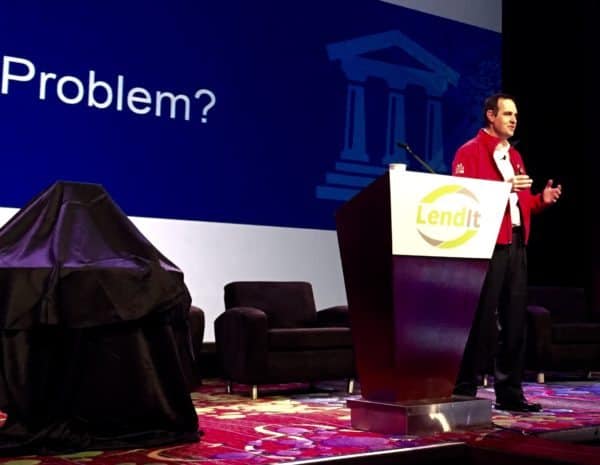
When Lending Club, as the worldwide leader in P2P/marketplace lending and, for that matter, in the entire global crowdfunding market, runs into trouble, it is bound to send ripples way beyond its home market, the United States.
 And it does.
And it does.
The fast emerging French crowdlending market is a good example. We asked the CEOs of leading crowdlending platforms and from a crowdlending comparison site in France to share their views on the Lending Club (NYSE:LC) issue and its impact. Their responses are as diverse as their business models which present very different proportions of institutional versus retail investors, ranging from 0% to over 80% of funds raised. However, they all agree that there is something to learn from the incidents.
Nicolas Lesur, Unilend: Crowdfunding’s mixed business models lead to conflicts of interest
 Nicolas is the co-founder and CEO of Unilend, the first crowdlending platform created in France in 2013.
Nicolas is the co-founder and CEO of Unilend, the first crowdlending platform created in France in 2013.
To date, the platform has raised nearly €20 million from over 10,000 lenders. Institutional investors represent less than 2% in a number of lenders and 10% to 15% in volume of funds raised on the platform.
As the president of the French crowdfunding association (Financement Participatif France), Nicolas is particularly sensitive to the governance issues raised by the Lending Club case. To him, Lending Club’s problems should make the sector reflect on the governance issues that arise from the mixed business models that some crowdfunding platforms have evolved into.
 Lending Club moved away from the marketplace model whose sole purpose is to match buy and sell orders and started behaving like a bank – by buying its own loans – and as an asset management firm – by selling packages of loans to its clients.
Lending Club moved away from the marketplace model whose sole purpose is to match buy and sell orders and started behaving like a bank – by buying its own loans – and as an asset management firm – by selling packages of loans to its clients.
Banks lend their own money and take risk on their balance sheet; hence, they must meet regulatory requirements such as Basel III. Asset managers manage other people’s money and invest on their behalf; hence, they are regulated as financial advisers. Platforms must clearly choose their business model because it has regulatory consequences. It also has an impact on the market valuation of the company. Marketplaces are currently much more highly valued by investors than banks. Even before the scandal, Lending Club’s stock was valued rather like a bank’s stock. Eventually, mixed business models potentially lead to conflicts of interest of the type observed at Lending Club.
That being said, Nicolas believes that the reaction to Lending Club’s governance issues was quite excessive. The main reason why Lending Club was hit so hard for a $22 million improper loan sale that did not even result in a loss is precisely because it was transparent.
Unilend will remain strongly anchored in the marketplace business model, a business model that requires transparency, fairness and traceability:
“A true marketplace model allows lenders and borrowers to know at all times where the money is and with whom. It does not decide on their behalf. It does not own their money.”
In September, a few changes in French crowdfunding regulations will come into force, including the introduction of a new debt instrument for SMEs called “mini bons”. For Unilend, which uses the mini bons, this will mean being directly regulated by the securities market regulator, the Autorité des Marchés Financiers (AMF), who will definitely scrutinize the business model for possible conflicts of interest.
Vincent Ricordeau, Lendopolis: Retail investor-based crowdlending is more resilient
 Vincent Ricordeau is the co-founder and CEO of crowdlending platform Lendopolis.
Vincent Ricordeau is the co-founder and CEO of crowdlending platform Lendopolis.
Lendopolis is a sister company of the very successful rewards-based crowdfunding platform KissKissBankBank which has collected €50 million from nearly one million backers to date. This may explain the focus placed on the “crowd” of retail investors at Lendopolis, which, in less than two years of operation, has raised €6 million from nearly 4,000 investors, 100% of them being retail investors.
 For Vincent, Lending Club lost its way a long time before the scandal and the subsequent dismissal of Renaud Laplanche. By progressively marginalizing retail investors and letting investment funds securitize Lending Club’s loans on their own terms, Lending Club de facto surrendered the control of the platform to the very same established finance that P2P Lending was supposed to present an alternative to. This change of course created a detrimental layer of complexity, and potentially of systemic risk, in what was supposed to be a simple and direct relationship between private lenders and borrowers.
For Vincent, Lending Club lost its way a long time before the scandal and the subsequent dismissal of Renaud Laplanche. By progressively marginalizing retail investors and letting investment funds securitize Lending Club’s loans on their own terms, Lending Club de facto surrendered the control of the platform to the very same established finance that P2P Lending was supposed to present an alternative to. This change of course created a detrimental layer of complexity, and potentially of systemic risk, in what was supposed to be a simple and direct relationship between private lenders and borrowers.
For Vincent, crowdlending platforms should, of course, not forego the opportunity to cooperate with institutional investors to accelerate their growth. However, this should not happen at the expense of retail investors whose interest will remain Lendopolis’ focus, alongside that of SME clients:
“Lendopolis’ top priority is to continue to offer simple, ethical and responsible crowdlending products to retail investors and SME borrowers.”
Winning retail investors to crowdlending still requires a significant effort of evangelization. Vincent’s main wish for a reform that could accelerate the development of the sector in France would be the introduction of tax incentives for retail investors who lend money to SMEs over crowdfunding platforms.
Olivier Goy, Lendix: FinTech’s image was hit, but European institutional investors’ appetite for marketplace loans as an asset class is as strong as ever
 Olivier Goy is the founder and CEO of Lendix, France’s leading crowdlending marketplace which recently reached its ambitious goal of lending €25 million in its first year of operation. This fast growth was enabled by a business model based for more than 80% on funds raised from institutional investors, family offices and other qualified investors.
Olivier Goy is the founder and CEO of Lendix, France’s leading crowdlending marketplace which recently reached its ambitious goal of lending €25 million in its first year of operation. This fast growth was enabled by a business model based for more than 80% on funds raised from institutional investors, family offices and other qualified investors.
For Olivier, who is also the treasurer of the “France FinTech” association, Lending Club’s woes have been quite a blow for the image of crowdfunding in France. Lending Club was the posterchild of success in the crowdfunding sector at large. But the image of the company was even more positive in France than elsewhere because the French press celebrated Renaud Laplanche as a successful French businessman. He made good headlines.
As people love to hate what they once extolled, criticisms – often quite misplaced ones ‒ have rained down on Lending Club. Moreover, some of these criticisms have been unwarrantedly extended to the entire Fintech sector.
 Beyond the image problem, the impact of the incidents has been small. European institutional investors are still very much interested in marketplace lending, as can be seen from two recent announcements: a $100 million loan program through Funding Circle by the European Investment Bank and €70 million multiplatform crowdlending fund by Eiffel Investment and French insurers Aviva and AG2R La Mondiale.
Beyond the image problem, the impact of the incidents has been small. European institutional investors are still very much interested in marketplace lending, as can be seen from two recent announcements: a $100 million loan program through Funding Circle by the European Investment Bank and €70 million multiplatform crowdlending fund by Eiffel Investment and French insurers Aviva and AG2R La Mondiale.
From the start, Lendix chose a retail and institutional co-investment model. The retail side is now ramping up with peaks of 1,000 lenders per projects on recent projects.
Institutional investors here have a strong appetite for marketplace loans as an asset class. Lendix raised a first fund of €26 million and is about to launch a second fund of €50 million among the same mix of institutional investors, family offices and qualified investors as before. Again, Lendix management will take a small minority stake in the fund as a bit of skin in the game to strengthen the investors’ trust.
Thomas de Bourayne, Credit.fr: Each platform writes its own story
 Thomas de Bourayne is the Chairman of Credit.fr. The platform is the most recently founded crowdlending platforms of our panel. It differentiates itself from competitors by imposing more restrictive selection criteria on SMEs borrowers such as the requirement of showing four years of financial records, when other platforms generally require only two. Credit.fr prides itself in the quality of its proprietary scoring algorithm which has so far delivered zero default on €3 million worth of loans.
Thomas de Bourayne is the Chairman of Credit.fr. The platform is the most recently founded crowdlending platforms of our panel. It differentiates itself from competitors by imposing more restrictive selection criteria on SMEs borrowers such as the requirement of showing four years of financial records, when other platforms generally require only two. Credit.fr prides itself in the quality of its proprietary scoring algorithm which has so far delivered zero default on €3 million worth of loans.
At present, 5,000 retail investors make up 98% of Credit.fr’s lenders. Institutional investors are only 100 in number but they already provide around one third of the funds loaned on the platform and Thomas expects this proportion to rise to between 50% and 60%.
Thomas agrees that Lending Club was the flagship brand of the global crowdfunding sector. However, its issues have very little impact on the French crowdlending market because this market operates in conditions and under regulations that strongly differ from the US market’s.
“Institutional investors here may have been taken aback by the Lending Club news. But it’s up to each platform to reassure its clients. As for Credit.fr, we’re writing our own story, step by step.”
Thomas sees the coming changes in the French crowdfunding regulation as quite positive. The introduction of the new debt instruments, the mini bons will allow SMEs to raise debt much more easily. Credit.fr will change its regulatory status to be able to trade these notes.
More generally, platforms will continue to diversify their business models, but relying on co-financing with institutional investors will remain key to creating trust among retail investors.
Mathieu George, Crowdlending.fr: Retail investors must be protected
 Mathieu George is the founder of Crowdlending.fr, a comparison Web site which lists the leading 13 French crowdlending platforms and publishes a monthly barometer based on their statistics.
Mathieu George is the founder of Crowdlending.fr, a comparison Web site which lists the leading 13 French crowdlending platforms and publishes a monthly barometer based on their statistics.
According to Mathieu, Lending Club’s woes have had little impact on the French market:
“Institutional investors may have taken notice but French retail investors have not shown much interest. They’d rather focus on their portfolio.”
Regarding platform risk, retail investors are Mathieu’s main concern. According to him French small investors are not mature enough for unbounded crowdfunding and must be protected against excessive exposure.
For that reason, Mathieu is not as thrilled as platform owners by the changes that will take place in France’s crowdlending regulation in September. Increasing the upper limit of capital that can be raised through equity crowdfunding from currently €1 million to €2,5 million may have a positive  psychological effect on the market at large. However, as the current average fundraising amounts to less than €500K, the lower ceiling was far from being a roadblock. In the same vein, raising the loan ceiling per project per investor from €1,000 to €2,000 was, in Mathieu’s opinion, premature. Small investors lend on average €150 per project. The current upper limit of €1,000 per project makes them aware of the risks and of the necessity to diversify their loans.
psychological effect on the market at large. However, as the current average fundraising amounts to less than €500K, the lower ceiling was far from being a roadblock. In the same vein, raising the loan ceiling per project per investor from €1,000 to €2,000 was, in Mathieu’s opinion, premature. Small investors lend on average €150 per project. The current upper limit of €1,000 per project makes them aware of the risks and of the necessity to diversify their loans.
On the positive side, however, Mathieu welcomes the creation of mini bons which, as marketable securities, will bring to retail investors some much needed liquidity.
 Therese Torris is an entrepreneur and consultant in eFinance and eCommerce based in Paris. She has covered crowdfunding and P2P lending since the early days when Zopa was created in the United Kingdom. She was a director of research and consulting at Gartner Group Europe, Senior VP at Forrester Research and Content VP at Twenga. She publishes a French personal finance blog, Le Blog Finance Pratique.
Therese Torris is an entrepreneur and consultant in eFinance and eCommerce based in Paris. She has covered crowdfunding and P2P lending since the early days when Zopa was created in the United Kingdom. She was a director of research and consulting at Gartner Group Europe, Senior VP at Forrester Research and Content VP at Twenga. She publishes a French personal finance blog, Le Blog Finance Pratique.

